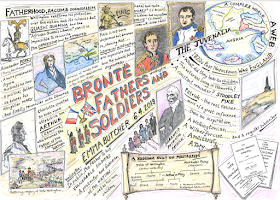 |
| Mark with his mind map of John Sutherland's talk. |
Starting
with a brief explanation of how mind-mapping developed, Mark gave a little
seminar on how he uses the technique to show graphically the most important
elements of a presentation. Along the way, he mind-mapped his own presentation.
Mark said the first step is to put the ``theme’’ in the middle of the page – in this case: ``Brontë Mind Mapping’’. Then concepts from the presentation can branch off or ``radiate’’ from the theme. Mind-map guru Tony Buzan called the technique ``an expression of radiant thinking,’’ Mark explained.
As items branch out from the central theme, connections and associations among the elements often can be seen more quickly in the graphical format. It’s also easy to add details and additional information. After doing a rough sketch during the presentation, Mark later refines it, adding color and graphic images.
Mark said the first step is to put the ``theme’’ in the middle of the page – in this case: ``Brontë Mind Mapping’’. Then concepts from the presentation can branch off or ``radiate’’ from the theme. Mind-map guru Tony Buzan called the technique ``an expression of radiant thinking,’’ Mark explained.
As items branch out from the central theme, connections and associations among the elements often can be seen more quickly in the graphical format. It’s also easy to add details and additional information. After doing a rough sketch during the presentation, Mark later refines it, adding color and graphic images.
 |
| John Sutherland's April 2018 talk. |
Mark created a colorful mind-map of
the April 2018 talk by John Sutherland, and another one for the April 2019 talk
by Emma Butcher.
 |
| Emma Butcher's April 2019 talk. |
Mark’s next Brontë project? – to
mind-map of Villette, Charlotte’s great Brussels novel. In this
challenging project, he will be helped by the ``image-creating ability’’ of the
Brontë siblings – in terms of both drawing and writing, Mark said.
No comments:
Post a Comment